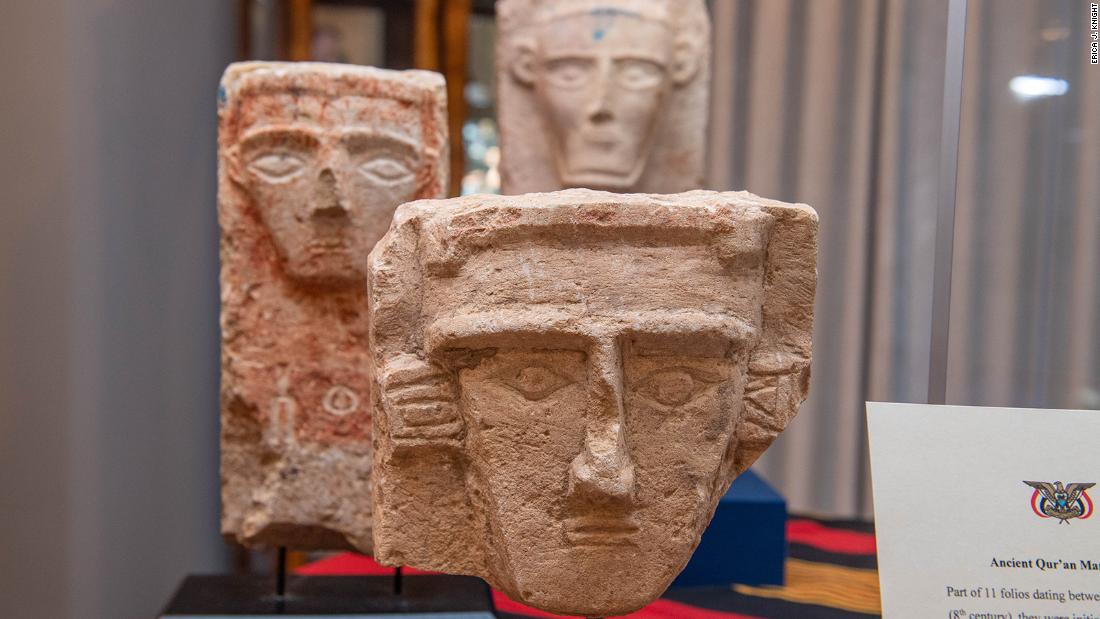

The United States has repatriated 77 looted artifacts to Yemen, including dozens of ancient funerary stones linked to a disgraced New York art dealer and 11 folios from early Qurans.
Among the artifacts being returned are 65 funerary stones, known as “stelae,” that date back to the second half of the first millennium BC. Featuring engraved faces, some of the objects contain traces of pigment or inscriptions revealing the names of the deceased.
A museum spokesperson told CNN that the stones were most likely looted from archaeological sites in northwestern Yemen. The Quranic folios are meanwhile thought to date back to the 9th century. An inscribed bronze bowl is also among the cache of artifacts.
The US Department of Justice said that 64 of the stelae were forfeited to officials during an investigation into Mousa Khouli, a convicted smuggler who sold plundered artifacts via his New York store, Windsor Antiques. The other 13 items were intercepted as they were being smuggled into the US, the Smithsonian said in a press release.
Stone stelae on display at a repatriation ceremony, hosted by Yemen’s embassy in Washington, D.C. on Tuesday. Credit: Erica J. Knight
The partnership between the Smithsonian and Yemen’s government was announced at a repatriation ceremony hosted by the country’s embassy in Washington, D.C. on Tuesday. As part of the agreement, some of the items could be publicly exhibited at the museum, including in its current show “Ancient Yemen: Incense, Art, and Trade.” Yemen’s government will have the option to extend the partnership after two years, depending on the state of unrest in the country.
The country’s ambassador to the United States, Mohammed Al-Hadhrami, said in a statement that “on behalf of the people and Government of Yemen, we are thrilled to see Yemen retaking ownership of its cultural heritage.”
“With the current situation in Yemen, it is not the right time to bring the objects back into the country,” he added. “The Smithsonian’s National Museum of Asian Art is a global leader in the field of cultural heritage and preservation. We are pleased to see these objects in their care.”
The stone stelae linked to Khouli are thought to have been smuggled into the US via the United Arab Emirates over a decade ago. Officials later seized incriminating correspondence and invoices containing “multiple inconsistencies” from Khouli’s home and gallery, according to the Department of Justice’s press release.
Other items seized in the investigation were returned to Egypt in 2015. But this week’s ceremony marks the first time in almost two decades that the US has repatriated cultural artifacts to Yemen, with the last being a single funerary stelae that was handed back in 2004.

The items returned to Yemen include 11 folios from early Qurans. Credit: Erica J. Knight
The Yemen war, which is being fought between Iran-backed Houthis and a Saudi-led coalition, has complicated the established repatriation process, however. The Smithsonian’s National Museum of Asian Art said in a press release that the country has “experienced heavy looting and destruction of its tangible cultural heritage” since the civil war began in 2014.
The museum added that the partnership represents an alternative to direct repatriation, calling the agreement an “exemplary model of how US museums can work with other countries to steward cultural objects and share them with broad audiences.”
The Yemeni embassy will advise the museum on research and conservation matters while the items remain in its care. The Smithsonian’s press release said that the collection of stelae “contributes to knowledge of ancient south Arabian onomastics (study of names) and funerary practices.”
Chase F. Robinson, director of the Smithsonian’s Arthur M. Sackler Gallery and Freer Gallery of Art, added in a statement that the partnership “is a powerful example of how shared stewardship of objects can build bridges and serve as a catalyst for learning and understanding.”
24World Media does not take any responsibility of the information you see on this page. The content this page contains is from independent third-party content provider. If you have any concerns regarding the content, please free to write us here: contact@24worldmedia.com

Common Mistakes When Using Athletic Field Tarps

High-Performance Diesel Truck Upgrades You Should Consider

Warehouse Optimization Tips To Improve Performance

Fire Hazards in Daily Life: The Most Common Ignition Sources

Yellowstone’s Wolves: A Debate Over Their Role in the Park’s Ecosystem

Earth Day 2024: A Look at 3 Places Adapting Quickly to Fight Climate Change

Millions of Girls in Africa Will Miss HPV Shots After Merck Production Problem

This Lava Tube in Saudi Arabia Has Been a Human Refuge for 7,000 Years

Four Wild Ways to Save the Koala (That Just Might Work)

National Academy Asks Court to Strip Sackler Name From Endowment

Ways Industrial Copper Helps Energy Production

The Ins and Out of Industrial Conveyor Belts